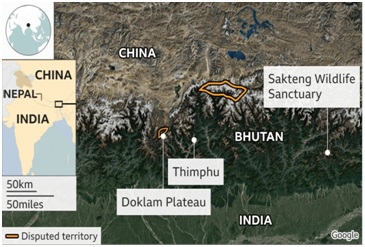

Context
Recently, China’s legislature has adopted a new border law that calls on the state and military to safeguard territory and “combat any acts” that undermine China’s territorial claims.
Background
- China promulgated new land boundary law in the midst of a 17-month border standoff between the two countries in eastern
- The eastern Ladakh border standoff between the Indian and Chinese militaries erupted on May 5 last year following a violent clash in the Pangong lake areas and both sides gradually enhanced their deployment by rushing in tens of thousands of soldiers as well as heavy weaponry.
- India-China over the years have worked out a host of agreements to resolve and handle the border differences. These include the:
- Special Representatives mechanism
- Agreement on Political Parameters and Guiding Principles of 2005
- WMCC (Working Mechanism for Consultation and Coordination on India-China Border Affairs) besides protocols
- CBMs
- India and China have already held 22 rounds of border talks under the framework of the Special Representatives dialogue which was set up to find an early solution to the border dispute.
Analysis
What is in the new law?
This is the first time, China has enacted a national law on the “protection and exploitation" of the country’s land border areas.
Aim (as claimed by China): To better maintain national security and manage border-related matters at the legal level amid regional tensions.
- Sovereignty and Territorial Integrity: The new law stipulates that the sovereignty and territorial integrity of the People’s Republic of China are sacred and inviolable.
- The state shall take measures to safeguard territorial integrity and land boundaries and guard against and combat any act that undermines territorial sovereignty and land boundaries.
- Responsibilities: It designates the various responsibilities of the military, the State Council or Cabinet, and provincial governments in managing the security and economic issues in border areas.
- The People's Liberation Army (PLA) “shall carry out border duties” including “organising drills” and “resolutely prevent, stop and combat invasion, encroachment, provocation and other acts”.
- The state shall take measures to strengthen border defence, support economic and social development as well as opening-up in border areas, improve public services and infrastructure in such areas, encourage and support people's life and work there.
- The state shall, following the principle of equality, mutual trust and friendly consultation, handle land border-related affairs with neighbouring countries through negotiations to properly resolve disputes and longstanding border issues.
- The Law includes a significant Article 43 that stipulates the support of the state for the construction of border towns, strengthening supporting capacity for the construction, and improving the functioning of border towns.
- In the past years, China has been constructing a number of towns with proper infrastructure close to the border in Tibet that have a significant part in border defence.
- By the end of 2020, there will be more than 600-well-developed high-standard border villages with accessible roads. Around 130 border roads have been built or reconstructed.

What are the concerns?
- It would formulate some of China’s recent actions in disputed territories with both India and Bhutan.
- The passing of the law coincides with stepped up Chinese activity along the land borders, which have mirrored actions in disputed waters in the East and South China Sea.
- It includes the PLA’s massing of troops in forward areas along the India border and multiple transgressions across the Line of Actual Control (LAC).
- China in recent years has been strengthening border infrastructure, including the establishment of air, rail and road networks.
- It also launched a bullet train in Tibet which extends up to Nyingchi, the border town close to Arunachal Pradesh.
- The construction of new “frontier villages” along the border with Bhutan.
Why is it significant for India?
- The new law drew sharp reaction from India as it was passed amid the protracted military standoff between the two sides in eastern Ladakh
- China claims up to 90,000 square kilometres in Arunachal Pradesh in the eastern sector.
- It has illegally occupied 38,000 square kilometres of Aksai Chin in the western sector of Jammu and Kashmir.
- While recent tensions in the western sector have been centred on Ladakh, both sides have lately clashed in Uttarakhand as well.
What’s China’s take on India’s concern?
- China said that its new land border law will not affect the implementation of existing border treaties.
- India and Bhutan are the two countries with which China is yet to finalise the border agreements, while Beijing resolved the boundary disputes with 12 other neighbours.
- India-China border disputecovers 3,488-km along the Line of Actual Control

- China-Bhutan row covers about 400 km
- India-China border disputecovers 3,488-km along the Line of Actual Control

|
China has a land boundary of approximately 22,000 km, with 14 countries |
Conclusion
Though the new law is not meant specifically for the border with India, this could create hurdles in the resolution of the 17-month-long military standoff at LAC.



